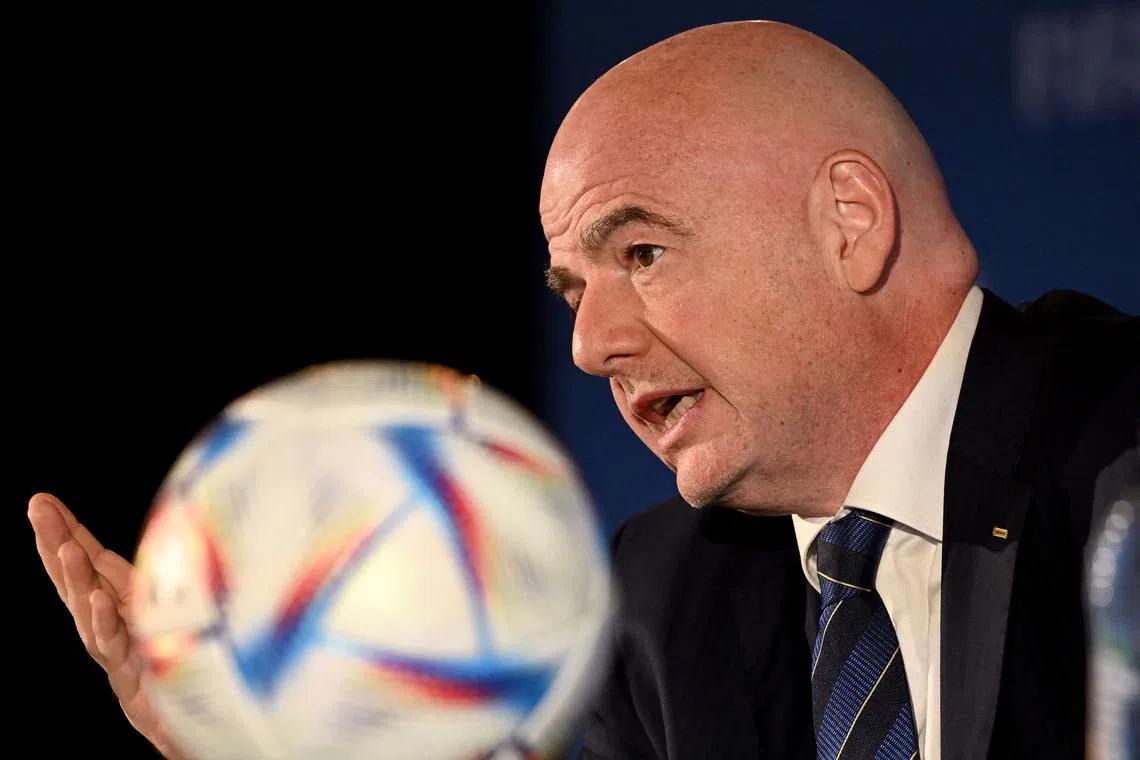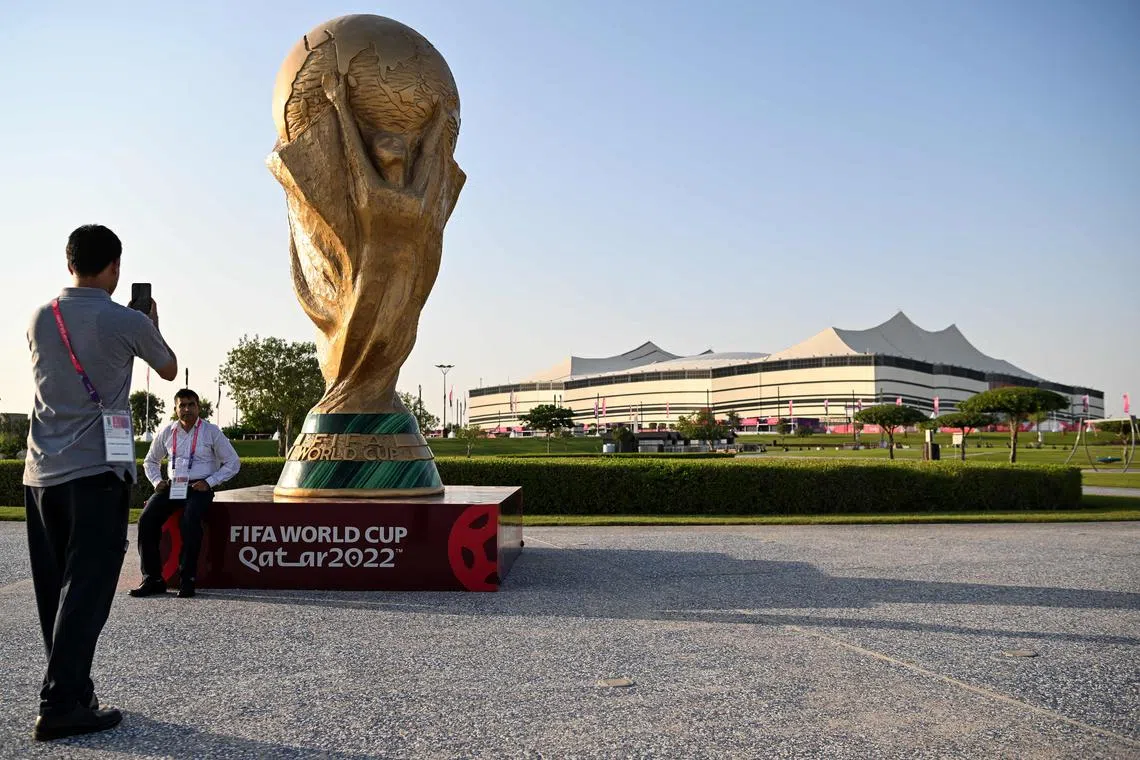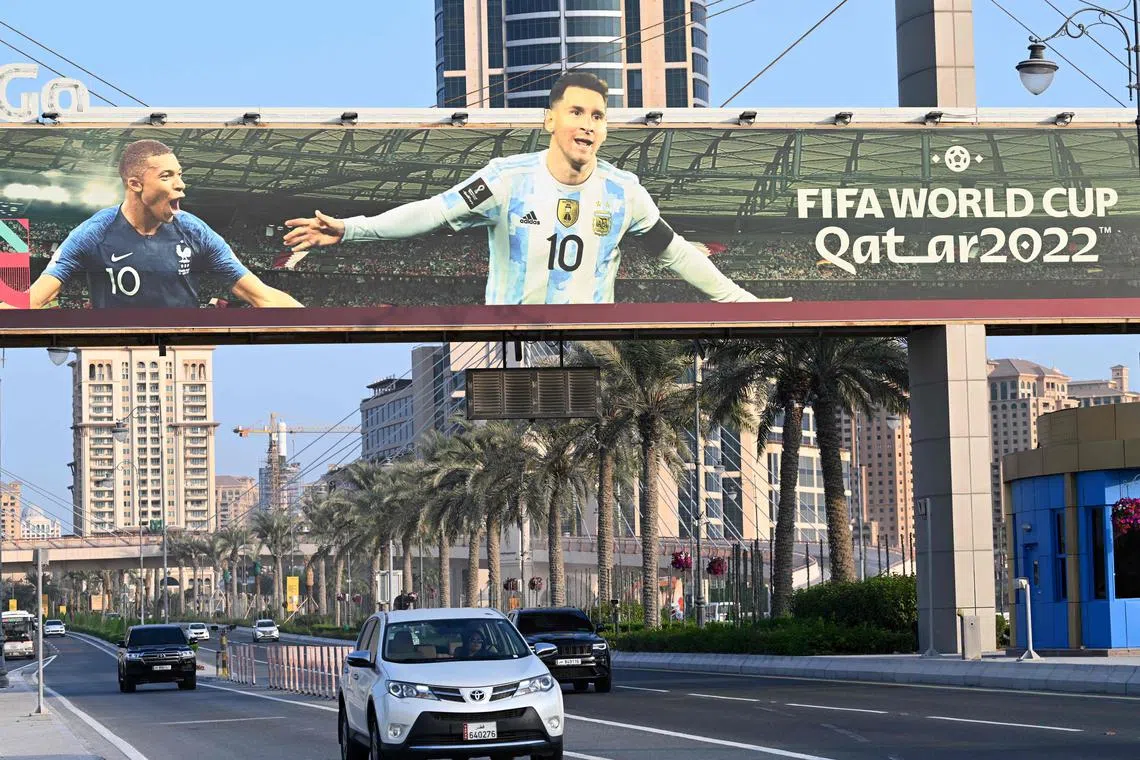Qatar primed for the Beautiful Game
The first Fifa World Cup to be held in the Middle East kicks off this weekend in Qatar, and promises to be quite the spectacle. Thirty-two teams will play 64 matches over 29 days, but only one can be crowned the best in the world.

IT IS December 2010 at Fifa’s headquarters in Zurich, and the eyes and ears of the sporting world are focused on Sepp Blatter – the then-president of world football’s governing body – as he holds a sealed white envelope containing the name of the 2022 World Cup host.
Amid a flurry of camera flashes, he slowly fishes out a piece of paper that has a single word – Qatar – printed on it.
That was a historic day for the oil-rich emirate, confirming that it would become the first country in the Middle East to stage the biggest international football showpiece, having fended off stiff competition from the United States, Australia, South Korea and Japan.
To describe the 12 years since as tumultuous would be putting it mildly.
Qatar’s lengthy and costly preparations for the World Cup have been dogged by all manner of controversy, including repeated allegations of corruption, human rights abuses and its stance on LGBTQ+ issues.
Some critics also took issue with how Qatar is hardly a football powerhouse and does not have much of a native tradition in the sport.
Navigate Asia in
a new global order
Get the insights delivered to your inbox.
While they won the last Asian Cup in 2019, the national team has never appeared in any of the previous 21 World Cups. They enjoyed automatic qualification this year by virtue of being the hosts.
Earlier this month, Blatter – who led Fifa for 17 years and is now 86 – caused a stir when he told a Swiss newspaper in an interview that “Qatar is a mistake” and that “the choice was bad”.
“It is too small of a country. Football and the World Cup are too big for it,” Blatter said of Qatar, the smallest host by size since Switzerland hosted the competition back in 1954.
Qatar’s population was just 1.7 million in 2010. Since then, it has nearly doubled to about three million – the vast majority of whom are expatriates and migrant workers.
Fifa’s current president Gianni Infantino, who was in Bali earlier this week as an invited guest at the G20 Summit, said that Qatar is fully ready and promised that the Arab world’s first World Cup will be a success.

He also called for peace on behalf of the footballing community, and urged all parties to agree on a one-month ceasefire in Ukraine throughout the tournament.
“Football is much more than just a sport. It has a huge social impact. It’s about passion, tolerance, inclusion and education,” he said. “Because football unites the world, the World Cup is an occasion to bring people together in peace, and enjoy something sorely needed in the turbulent times we live in.”
Record budget
Blatter’s criticism of the Qatar decision, of course, has come far too late for action to be taken. If anything, it only diminishes the hard work by the organising committee over the past 12 years in putting the event together.
According to some estimates, Qatar spent an eye-watering US$220 billion to host the World Cup, more than 60 times what South Africa forked out for the 2010 edition – though this includes major transport infrastructure, with the cost of the actual stadiums amounting to just under US$10 billion.
To put this figure in perspective, Qatar’s annual gross domestic product is US$180 billion.
The event’s estimated revenue is but a fraction of this cost: it may contribute US$17 billion to Qatar’s economy, according to initial projections.
As many as 1.2 million visitors will descend on the capital Doha over the next 29 days, with three million tickets and 240,000 hospitality packages sold to date.
The government has spared no expense, building 100 new hotels, dozens of new roads, a new metro system connecting all the stadiums, and even a spanking new airport that can cope with the expected 1,300 daily flights arriving into and departing from Doha.
The month-long tournament – which will be beamed to a global broadcast audience of five billion people – is on track to top the US$5.4 billion in revenue that organisers Fifa earned for the last World Cup held in Russia in 2018.
Climate control
A total of 64 matches are taking place in eight state-of-the-art stadiums in and around Doha, all of which are no more than 80 km apart. Two of the venues are separated by just a 10-minute drive, and the compact nature of this Qatar World Cup makes it possible for fans to attend two matches a day if they wish.
Seven of those massive stadiums were built from scratch, making this the largest infrastructure project in the history of the World Cup.
All of the stadiums were designed to highlight Arabic tradition and culture. What’s more, they are all fully air-conditioned, even though the average temperature during the tournament will be around 24-29 deg C – far lower than the scorching 48 deg C weather that Qataris experienced in June this year.
That intense and unforgiving summer heat is the main reason why Fifa agreed to move the World Cup to November and December for the very first time, instead of the traditional June-July window.
This necessitated an unprecedented reshuffle of the global football calendar. For instance, the English Premier League is on a six-week mid-season break for the first time in its history, while Germany’s Bundesliga is on a longer than usual 10-week hiatus.
Qatar, the reigning Asian Cup champions that are currently ranked 50th in the world, will get things going on Sunday night (Nov 20, 11.55 pm Singapore time) against Ecuador at the 60,000-seater Al Bayt Stadium.

This venue – named and designed after the tents used by nomads in the Gulf states – is the furthest from central Doha but one of the biggest, with a fully retractable roof.
Ten games, including the grand final on Dec 18, will be played at the 80,000-capacity Lusail Stadium, whose futuristic design resembles the handcrafted bowls of the Arab world.
There’s also the uniquely named Stadium 974, which seats 40,000 fans and is located near the seafront corniche, about 5 km from Doha’s international airport. The stadium was designed with 974 shipping containers, with that number being Qatar’s international dialling code.
Cashing in
The controversy surrounding Qatar as the host has not deterred global brands from splashing out on World Cup sponsorship deals, with companies looking for means and ways to cash in on the hype.
Many of the world’s top brands are associated with Fifa, including the likes of Adidas, Coca-Cola, Hyundai, Wanda Group and Qatar Airways.
In the months leading up to the big kick-off, fans all over the world have snapped up official team jerseys. Adidas, Nike and Puma collectively supply the kits for 26 of the teams who have qualified to play in Qatar.
Here in Singapore, replica jerseys typically sell for well over S$100 each, and fans have been known to buy both the “home” and “away” versions of the shirts of their favourite teams.
According to a report by Japanese advertising and public relations firm Dentsu, the Qatar World Cup is predicted to have a US$2 billion positive impact on advertisement spending, even though the tournament clashes with major shopping events such as Black Friday and the build-up to Christmas.
Football extravaganza
With the opening ceremony and the first match just around the corner, football fans across the world – especially in Asia – are all set for sleepless nights and extra doses of caffeine as they prepare to savour the action.
In Singapore, 24 of the games will be played at the ungodly hour of 3 am, including both semi-finals.
Another 25 matches will begin at either 11 pm or midnight, with the remaining 15 fixtures starting at the more friendly times of either 6 pm or 9 pm.
Qatar, for all it has endured since being awarded the tournament, is simply looking to put on a good show on the pitch.
The national team knows full well that gaining maximum points against Ecuador on Sunday is a must if they are to have any chance of escaping from a tough group that also includes the Netherlands and Senegal.

The favourites to win the trophy include defending champions France, and former winners Argentina, Brazil, Germany and England. According to data from Nielsen company Gracenote, Brazil is the most likely to succeed with a 20 per cent chance of winning, having last triumphed in 2002. Their arch-rivals Argentina have a 16 per cent chance of becoming world champions for the first time since 1986.
There are several dark horses that fancy their chances of going far in the tournament, among them Belgium, Portugal and Croatia.
Asia has traditionally not fared well at the World Cup, and the continent’s hopes fall on the shoulders of the trio of Australia, South Korea and Japan.
The South Koreans – semi-finalists back in 2002 when they co-hosted the tournament – are grouped with Uruguay, Ghana and Portugal, and it would be quite a surprise if they somehow reach the Round of 16.
The “Samurai Blue”, as Japan are known, have much more difficult opponents to deal with: Germany, Spain and an unpredictable Costa Rica.
Australia was the penultimate team to qualify for Qatar, and few people – save for their own countrymen – give them a realistic chance of surviving a group that contains France, Denmark and Tunisia.
After 865 qualifying matches held over three years and involving 206 countries, the stage is finally set for one of the 32 nations to overcome their opponents in Qatar and hoist the World Cup trophy up high.
Decoding Asia newsletter: your guide to navigating Asia in a new global order. Sign up here to get Decoding Asia newsletter. Delivered to your inbox. Free.
Copyright SPH Media. All rights reserved.






